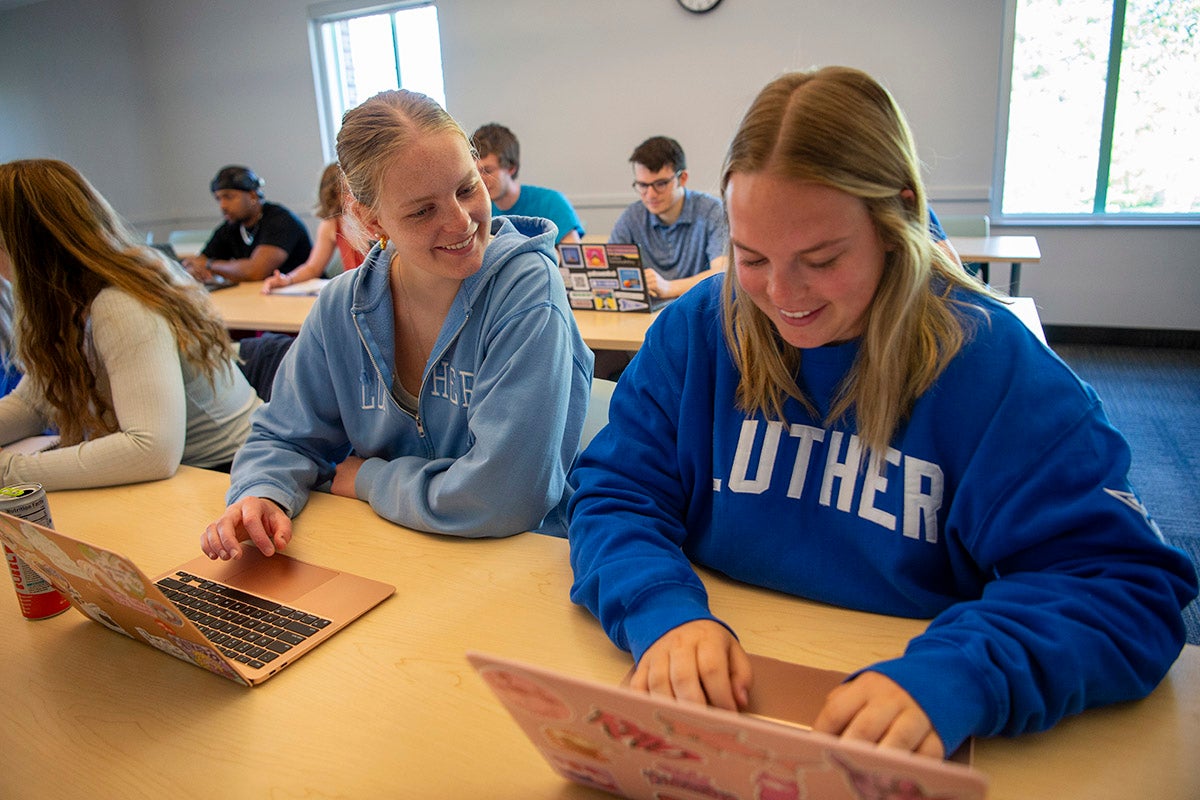Study Habits to Start Now

Luther College student studies in the Valders pit
Studying effectively is one of the most important skills for academic success in college. It’s not just about how much time you spend reading your textbooks or how often you go to lecture, but rather how you use your time effectively. By building strong study habits now, you’ll be better prepared to handle your coursework, retain information, and go into exams with confidence.
Take Good Notes
Taking effective notes in college is extremely important. It’s not just about writing things down but also organizing the information in a way that helps you understand and retain it. Here are two methods to try out.
The Cornell Method
The Cornell Method is one of the most effective note-taking methods, as it promotes active recall and makes for easy review of notes before exams.
During lecture, begin by dividing your page into three sections. On the left leave space for keywords and questions, the right for your main notes, and the bottom for space to summarize the page of notes.
When taking your notes in lecture, write your main ideas on the right column and any questions you have in the left column. After lecture, add keywords and ideas in the left column and summarize the page at the bottom.
Mapping Method
Visual learners may prefer the Mapping Method, as it involves creating diagrams or “maps” that show the relationship between concepts. This method can be used alone or as a supplement to other notes.
During lecture, begin by writing the central idea down in a bubble in the middle of your page. Afterward, link all of the related topics to that central idea, and so on.
Spaced Repetition
Cramming the night before might get you through a test, but it won’t help your long-term retention for when that final exam rolls around. Spaced repetition is a powerful study technique that involves reviewing material at increasing intervals over time. You can do this by making your own flashcards, but an easier method is to use apps. I strongly recommend using Anki, which emphasizes studying with spaced repetition. The app also comes with hundreds of extensions you can use to customize your studying interface. Quizlet is another good app that automates spaced repetition with digital flashcards and quizzes.
Take Breaks
Studying for hours without stopping might seem like a good idea, but it’s actually counterproductive. A good technique to try instead is the Pomodoro Technique. This method is a great way to maintain concentration and avoid burnout. You’ll be surprised how much you can get done with this!
First, set a timer for 25 minutes and study until the time is up. After that, take a 5 minute break. That combination is called a “Pomodoro”. Every four Pomodoros you should take increasingly longer breaks, ending around 30 minutes, depending on how long your study session is.
Make a Space Just for Studying
Your room might seem like a good place to study, but it’s usually not. TVs, social media, your bed, friends and roommates, and other distractions can all lead to an unproductive or absent study session. Try to find a study spot and study there frequently. Make sure the space makes you comfortable, is relatively quiet, and is a place that your brain will associate with studying when you walk in. A library, quiet lounge, or a coffee shop are all good options. Don’t be afraid to explore your campus or community and try new studying spots!
Find a Study Buddy
Studying doesn’t have to be done all by yourself. A reliable study buddy can help keep you accountable, quiz you before exams, explain concepts from a different perspective, and make studying more enjoyable in general. Try to find someone who will encourage you to fulfill your academic desires and not just distract you from your work.
Task Prioritization
In college, your to-do list can feel endless. That’s why you need task prioritization. Use a planner or a digital app to break down assignments by urgency and importance. Some good applications for this are Todoist or Yoodoo. Make sure to check your syllabus for important due dates!
Strong study habits are the foundation of academic success. Whether it’s taking organized notes or simply finding a good study spot, the way you study matters. Start practicing these habits now so they become second nature. The more consistent you are, the more prepared you’ll be to take on whatever academic challenges come your way.
Studying Resources
Related Posts

Follow a day in the life of a communications student, and see how they balance their coursework and their daily life.

Starting college? Here’s what to expect in the classroom, and how to handle the changes with confidence!
Admissions Office
Luther College
700 College Drive
Decorah, Iowa 52101
Phone: 563-387-1287